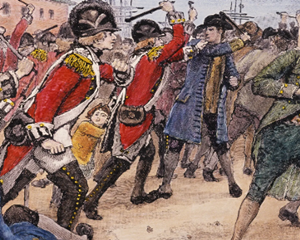One such American was John Adams, a Boston lawyer and politician, deeply read in history and philosophy, and one of the most eloquent patriot leaders in the colonies.
其中一人就是約翰·亞當斯,波士頓律師和政治家,對歷史和哲學造詣頗深,是殖民者中最雄辯的愛國領袖之一。
He believed fervently in those hard won liberties -- no taxation without consent, no standing armies, no martial law.
他篤信來之不易的自由--未經許可不得征稅,不得有常備軍,不得有軍事管制。
When he looked at what Britain had become, he no longer recognised a pristine temple of liberty, and no wonder.
但當看到英國的變化后,他不再承認那個自由純潔的廟宇,這也難怪。
Thanks to the unrelenting wars with France, Britain had become a huge military state, supporting a massive army, navy, and an insatiable tax collecting machine.
由于與法國不懈的戰爭,英國變成了軍事大國,支持著龐大的陸軍、海軍,和永不知足的稅收機器。
Adams's Britain, the shrine of freedom, was, of course, a fantasy, a dream Britannia.
亞當斯的英國,那個自由的神殿,無疑是空想,夢想中的大不列顛。
But this was a dream that John Adams woke up with every morning. And from such nagging visions comes action.
但這個夢,約翰·亞當斯,每天都在做。如今這無休止的夢想終于化為現實。
He would not pay the taxes, and he was not alone in this struggle.
他不再繳稅,他也不是孤軍奮戰。
Angry, wealthy Boston in the 1760s was exactly the kind of place that might breed a revolution.
18世紀60年代,憤怒富庶的波士頓最有可能孕育革命的種子。
Adams, his friends and neighbours, argued about everything. They attended public meetings in droves.
亞當斯和他的鄰居朋友議論所有的事。他們結隊參加公眾集會。
Gossip flew around the cobbled streets in minutes and roused the citizens to use their muscle -- fast and fierce in opposition to British taxes and those who tried to enforce them.
流言蜚語瞬間充斥了街頭巷尾,喚醒市民們舉起拳頭,迅速而猛烈地反抗英國的稅收以及試圖奴役他們的人。
Stunned by this strength of feeling, the British hit on a tax by stealth.
被強烈的民意震驚,英國政府又生一計,暗中收稅。

One only of interest to bureaucrats, something the mob couldn't possibly notice, or so they thought.
官僚們唯一想到的是暴民們可能發現不了,至少他們這么認為。
So, when the British government decided to put a stamp on the paper which official documents, handbills and newspapers were printed on,
于是,英國政府規定紙上都要貼印花稅票,包括公文、傳單和報紙,
what in London looked harmless enough, in Boston seemed like a tax on knowledge.
在倫敦看起來似乎已經足夠隱蔽,在波士頓看來卻是掩耳盜鈴。
In that dangerously over-informed city, it really lit a fire.
在消息過分靈通的城市,燃起了一把火。
After all, who uses official documents and reads newspapers?
究竟是誰在用公文,誰在讀報呢?
Well, only every single lawyer, merchant, minister, publisher and pamphleteer across the 13 colonies.
是十三個殖民洲里每一位律師、商人、牧師、出版商和小冊子作者。
Anyone who has to deal with an official document now hates you. And who are they?
任何用到公文的人都會心生怨恨。他們又是誰?
Only the best educated and loudest of the colonial population.
是受過最好教育和最有號召力的殖民者。
Their leadership was prepared to mobilise anger on the Boston streets. The mob tore down the house of the Governor of Massachusetts.
他們的領導才華足以鼓動起波士頓街頭的憤怒。民眾拆毀了馬薩諸塞州州長的府邸。
Back in Britain, this violent opposition divided parliament almost as strongly.
回到英國,如此暴力的反抗使議會產生嚴重分歧。
The government was outraged at the insolence of colonials who were protected by our care, and demanded that they should yield obedience.
政府對受保護下的殖民地居民如此之傲慢感到十分震怒,要求他們乖乖地屈服。
Up got William Pitt, the man who'd done most to make America British, to demand the repeal of the Stamp Act and save his empire.
但上至威廉·皮特,對北美的英國化付出最多的人,卻要求廢除印花稅法,拯救帝國。
I rejoice that America has resisted. I would argue that even under former arbitrary reigns, parliaments were ashamed of taxing a people without their consent.
我對北美的反抗感到欣慰。我要說,即使是在從前的專制統治時期,議會也羞于向未經同意的民眾收稅。
The gentleman asks, "When were the colonies emancipated?" But I desire to know, when were they made slaves?
有人問,殖民地是何時獲得解放的?但我想知道,他們是何時淪為奴隸的?
As the war for public opinion escalated, the American politician and publisher, Benjamin Franklin,
隨著公眾輿論的升級,美洲政治家和出版商本杰明·富蘭克林
produced an image that quickly seized the public imagination -- a nightmare vision of a dismembered Britannia ruined by alienating her colonies.
創作了一副畫,立刻喚起了公眾的想象,一個噩夢般被肢解的大不列顛因怠慢殖民地而被毀。












